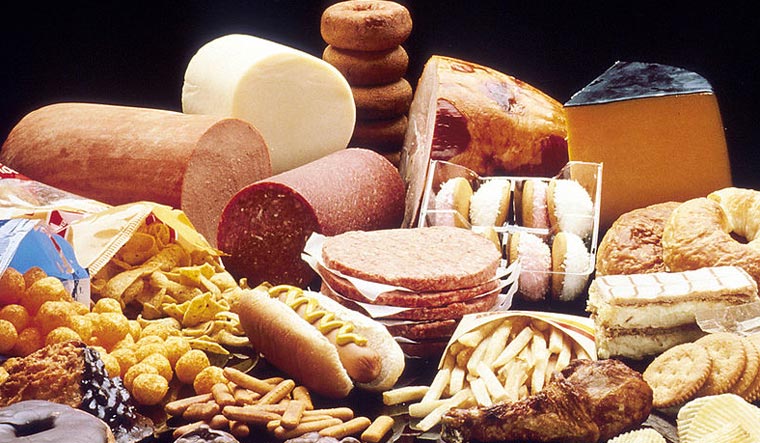Go slow on that glass of full-fat milk. Skip the temptation to slather some buttery goodness on that warm toast. And too many of those golden egg yolks might just be hastening your trip to the cardiologist's chamber.
Saturated fats are bad news for heart disease, according to the WHO's latest draft guidelines on the intake of saturated fats and trans fats that were released on Friday. These guidelines are being updated after 15 years and are "individual specific"—instead of a population average—for both adults and children.
The draft guidelines call for reducing the intake of saturated fats to less than 10 per cent of an individual's daily calorie count (less than 30 grams—50 grams of butter, or, one litre of full-fat milk would complete the recommended intake) and trans fats to be less than one per cent of the total.
Polyunsaturated fatty acids and monounsaturated fats are recommended as replacement for these fats.
The new guidelines come in the wake of a raging debate over whether saturated fats do play a role in causing heart disease—particularly in light of the Prospective Urban Rural Epidemiology (PURE) study that was published in Lancet last year, overturning the conventional wisdom on fats. According to the PURE study, the problem lay in a high carbohydrate diet—rather than high fats.
Several cardiologists, such as Karnataka-based Dr B.M. Hedge—a proponent of coconut oil—and more recently, UK-based Dr Aseem Malhotra, have been quite vocal about the fact that saturated fats are not really the 'devil' when it came to heart disease. For instance, according to Malhotra, instead of fats, the focus needs to be on sugar and processed foods and their harmful effects.
However, at a virtual press conference to launch the new guidelines, WHO experts stuck to the conventional understanding on going slow on fats.
"Non-communicable diseases (NCDs) are the world's leading cause of death. In 2016, NCDs were responsible for an estimated 39.5 million (72%) of the world’s 54.7 million deaths. Of the major NCDs, cardiovascular diseases (CVD) were the leading cause of NCD mortality in 2016, and responsible for nearly half of all NCD deaths," said Dr Francesco Branca, director, WHO Department of Nutrition for Health and Development.
Branca, who was speaking at the conference to launch a public consultation on the guidelines that will last until June 1, said that many of these deaths were "premature, under the age of 70, and in low and middle-income countries.”
Modifiable risk factors such as unhealthy diet, physical inactivity, tobacco use and harmful use of alcohol were the major cause of heart disease. "Dietary saturated fatty acids and trans fatty acids are of particular concern as high levels of intake are correlated with increased risk of cardiovascular disease," Branca added.
Saturated fatty acids are found in foods from animal sources such as butter, milk, meat, salmon and egg yolks, and some plant-derived products such as chocolate and cocoa butter, coconut, palm and palm kernel oils, he said. Trans fats, however, are of two kinds. "These can be industrially produced by the partial hydrogenation of vegetable and fish oils. But they also occur naturally in meat and dairy products from ruminant animals (cattle, sheep, goats, camels, etc.)," said Branca.
Industrially-produced trans fatty acids are found in baked and fried foods (doughnuts, cookies, crackers and pies), pre-packaged snacks and food, and partially hydrogenated cooking oils and fats, which are often used at home, in restaurants, or in the informal sector, such as by street vendors.
Qualitatively, there's "not much difference" between the trans fats from animal and industrial sources, when it comes to risk for cardiovascular disease, Branca told reporters. "With average diets, the trans fats that come from diary sources is below one per cent. So, what we are really concerned with is industrial trans fats," he said.


